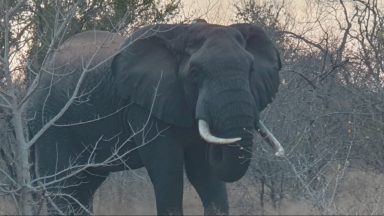This week, Peace Parks TV is following an elephant translocation that will see 23 elephants moved from an area where they face human-wildlife conflict in Maputo National Park’s buffer zone to a safe haven in Zinave National Park. Everything had been going smoothly, but after darting a family herd, the team discovers that one of the baby elephant has serious injuries that were sustained days before the capture operation.
It appears that these injuries were sustained from another elephant’s tusk, most likely a young male who might have been in musth. This periodic condition occurs in elephant bulls whereby they have heightened levels of testosterone which cause them to exhibit more aggressive behaviour. Worry soon set in as the vets realise the severity of the injuries and waste no time in treating the calf. It wasn’t long until wildlife vets, Dr Hugo Pereira and Dr Isabel Almeida, had cleaned out the wounds and placed the sleeping baby elephant in the crate, where it would soon be woken up and reunited with its worried mother.
The vets wait in anticipation for the calf to wake up, and after a few tense moments, the elephant manages to get to its feet and is reunited with its mother and other family members who immediately surround it to form a protective shield. Elephants have highly developed emotional and social behaviour, as was clearly on display here. They form incredibly strong family bonds, so it is integral to the wellbeing of all the animals that the herd is moved together.
After arriving in Zinave National Park, the team awaits with bated breath after the long, bumpy road to see how the tiny calf handled the journey. Although it was monitored along the way, it was difficult to see the small animal clearly because the mom and the other family members were hovering around it to keep it safe. Thankfully, it’s not long until everyone can breathe a sigh of relief as they spot the little elephant hopping out on its mother’s heels, safely making its way out of the crates to join the rest of the family already exploring their new home.
Although translocations such as these place short-term stress on the animals, it is a necessary conservation strategy that helps protect the species and mitigate human-wildlife conflict. In the dry season, resources such as food and water are limited and unfortunately the tasty-looking crops and fields of the communities that live in Maputo National Park’s buffer zone are under threat of crop-raiding by elephants. This results in already poor farmers losing their entire harvest, so in order to protect their livelihoods, they target many of these elephants.
To avoid this conflict, Peace Parks Foundation, Mozambique’s National Administration for Conservation Areas, Mozambique Wildlife Alliance and Conservation Solutions are all working together to give this herd the opportunity to roam freely and safely in Zinave National Park.
Stay tuned to Peace Parks TV as we learn more about what lies ahead for the herd in their new home!

